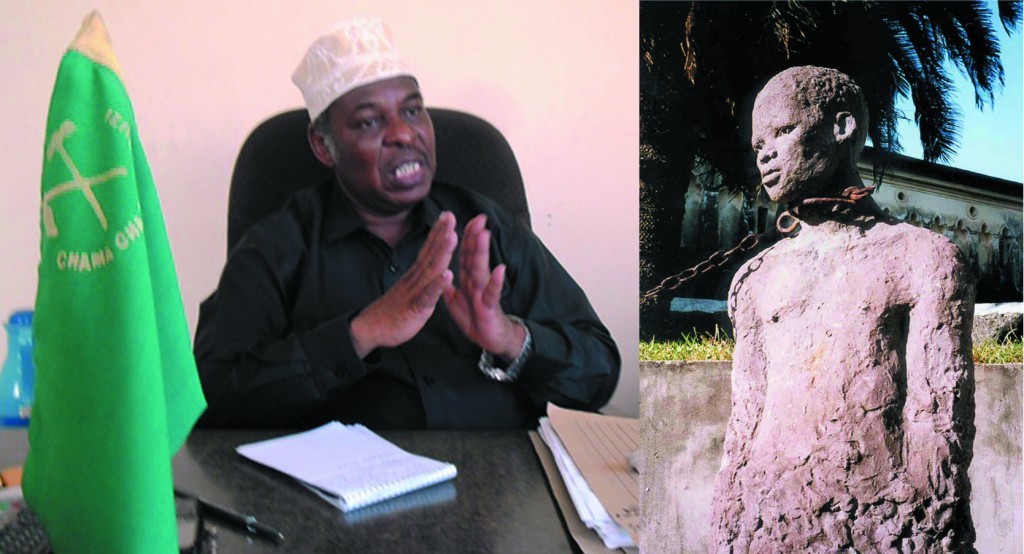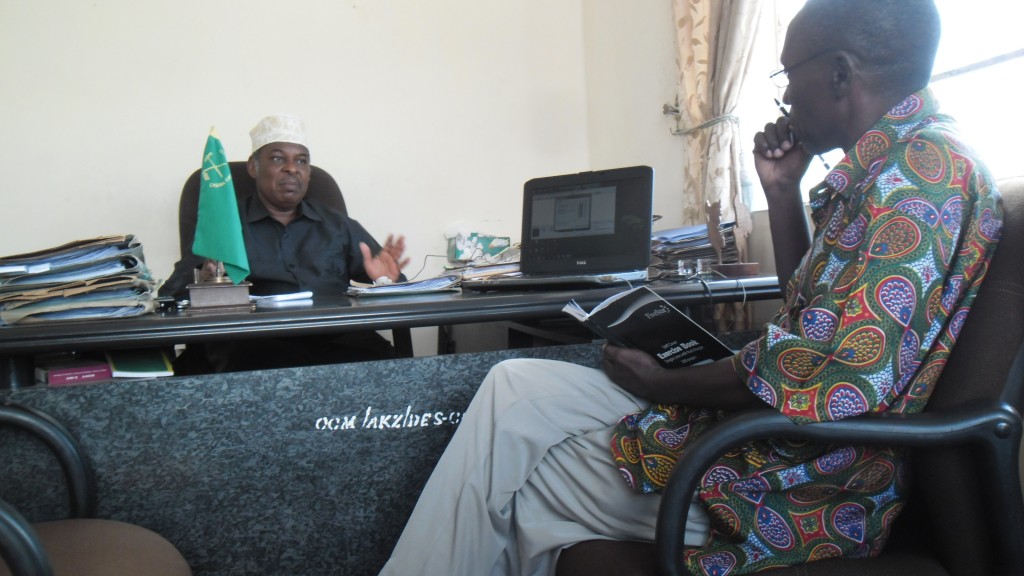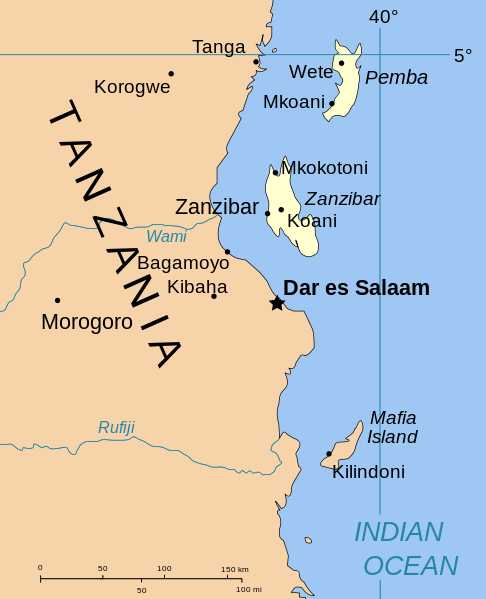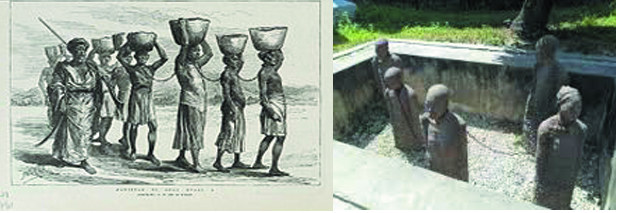[Published For the First Time in Early 2014].
There is Silent Anger in Zanzibar….
But Any Reconciliation Effort of the Aggrieved in the Islands is time barred; It Would Amount to Opening Wounds Which Should’nt be Opened. What is Needed Here is to Forgive and Forget the Past….
Tanzania’s semi-autonomous islands of Zanzibar have achieved a lot of economic development under the guidance of the existing two-tier government system, the ruling Chama Cha Mapinduzi (CCM) Deputy Secretary General for Zanzibar, Vuai Ali Vuai argued in the first part of this two-part series of interviews. This second part of the interview focuses his argument on resource use in the islands and what appears to be evidence of an underlying anger in the archipelago politics. The Deputy CCM Secretary General is being interviewed by the journalist Jaston Binala:
VUAI ALI VUAI: There is anger here. But the anger which exists against the establishment here in Zanzibar does not have roots in the absence of development. And this anger is rooted in the fact that the Africans of Zanzibar have managed to run their government successfully for 50 years. Let me go back to the question of development in Zanzibar. Zanzibar’s first president Sheik Abeid Amani Karume got killed. It doesn’t matter very much now that they can stand somewhere with his tape recordings as if they believe in him. Its a bluff!
Karume was the lead fighter for development here. He built houses at Michenzani. He stood for all the development we are talking about today. But they were not satisfied with his leadership and all that he stood for. Some people just won’t be satisfied. From the look of things, killing him was not the only thing they had planned. More was planned to be done, but the other plans have failed; their intention was to show that they do not have faith in the existing leadership; to show that they do not have faith in the government—but they have not made this stand obvious.
There are people who claim the ruling CCM party is made up of conservative people. But the same people saying CCM has Conservatives have permanent office bearers contesting for public office permanently; if you want to get battered, point a finger at one of these permanent leaders to say this one must go… I am not going to mention names here.
JASTON BINALA: Through a brief observation I have made here in Zanzibar, I get the feeling the people opposed to the Zanzibar – Tanganyika union at present are not citizens with foreign origins; let me be specific here by saying this: that I have gathered the opponents are not Arabs as some people on the mainland may want to believe. You find many opponents of the union are black Africans in Zanzibar.
What would you tell people who think opponents of the union are those who were robbed of power in 1964, or their relatives, or their grandchildren; those people who may have a desire to reverse the 1964 revolution using democracy? Through what may look like avenging the revolution… Do you see any evidence of anger here? Or an attempt to revenge the revolution? Please say something about this.
VUAI ALI VUAI: I said this earlier–that there is a problem. When such problems happen in a country you begin to ask yourselves. You do not sit back and say, oh well, so these problems are here now; we’ll just sit back, watch and wait. When the President of a country is murdered, that is not a small event. Which President was murdered here in East Africa? There is no one else who was murdered like President Karume. To us that was not a small event. That was not a small event.
There are people who are angry here. But there is another thing which you can liken or link to this event. When multi-party democracy came, those members of political parties which were opposed to Afro-Shirazi party, 90% of them are in agreement with the idea of removing Chama Cha Mapinduzi (CCM) from power. Can we not use this as one of the factors?
I am saying fine, we may not have direct evidence, but by a considerable margin are you not able to see what is happening here today? Are you not seeing the opponents? As I sit here, am I not seeing you oppose this? Do I not see you? This is obvious. You can see this.
I am saying I agree with you. But these matters are obvious. I know you might say give me your evidence, etc, etc; fine, I do not have the evidence—I do not have direct, concrete evidence; But what about circumstantial evidence? Immediately these people heard the news that multi-party democracy had been allowed, vooom—immediately they rushed. They determined this was the opportunity and said to themselves ‘we were removed that time, this is now our chance.’ And as time passes, just look at them as the events unfold. We now have the constitutional process; I am saying just look at them. They are now using NGOs.
I don’t want to bring segregation here because our party, the Afro-Shirazi party, was not a segregative party ever since it was started. [Editor’s Note: Afro-Shirazi party was the indigenous African party which led the Zanzibar revolution in 1964 and later merged with the mainland Tanganyika African National Union, TANU, in 1977 to form the current ruling Chama Cha Mapinduzi, CCM]. This was the reason we had in our party all kinds of people.
I made a statement three days ago to say we had a member of Asian origin in our party. This member gave us a house to use and to keep as our own. This house is located at Mji Mkongwe. This Asian was an Afro-Shirazi party member. This is good. Our party has no segregation; but issues do arise sometimes and we wake up. Zanzibar’s problem is not development. We only have people who are angry at the existing administration.
It is possible their basis for anger is, maybe, the length of time the administration has been in power. Development is not the problem here. They should give other reasons. We have made a lot of progress under the two-tier government system led by the Zanzibar Revolutionary Government and the Union Government.
If there is something to be more proud of, however, this has to be the peace and tranquility that Tanzania has enjoyed on both Zanzibar and the entire United Republic; and to achieve this we have depended on each other. Brothers on the mainland should not think we have not made a contribution to this strong security.
When we were invaded at Kagera, Zanzibaris left the islands. And some of them did not come back. They died in Uganda to save our country; to save Tanzania.
When Zanzibar runs into trouble of any kind, we run to our brothers for help. And we work together to solve the problem. That day when the ship sank in the ocean, we got a lot of help. The magnitude of the disaster would have been much bigger if it were not for that helicopter from Dar es Salaam which flew to the scene of the disaster at sea. Yes, dhows did arrive at the disaster area but they could not locate where the ship was until the helicopter arrived. I am saying we depend on each other!
So when people talk about a separation, we really are talking about digging a grave for ourselves just to satisfy some people’s desire to get positions and titles like Mwalimu Nyerere once said. But what is worse is this—that if this Union should break up, the mainland will also not be peaceful. But the situation in Zanzibar will be worse because the segregative, separatist feelings of people identifying themselves as being from Pemba and others identifying themselves as being from Unguja will surface. I do not want to see us get to that point. This is one of the reasons I will defend the union the best way I know how. I would like that this union stays.
There are some people who do not see it this way. But I see it as if with certainty the way of life as we know it will change. The social integration, the opportunities available to us on the mainland will change—which is something people are not wanting to see. But I see this coming. But worse of all, I see the surfacing of anger between the people of Pemba island and the people of Unguja island.
JASTON BINALA: Maybe I should now ask you to discuss the question of reconciliation in Zanzibar. A lot of people died during the 1964 revolution. I have never heard at any one time anybody talk about a reconciliation in Zanzibar, between those who lost their relatives, and those who conducted the revolution.
Do you not see that maybe these anti-union sentiments we hear from Zanzibar may be partly based on unresolved anger? Our brothers in South Africa have gone through the process of reconciliation. Many people died there during the search for majority rule. Many people died in Rwanda. We have heard effort being made to reconcile people in Rwanda. Here in Zanzibar, something very big took place; lots of people lost their lives. I have not heard anybody talk about reconciling people here. Don’t you think that maybe this might be one of the reasons behind the agitation we hear coming from Zanzibar?
VUAI ALI VUAI: Aaaah…let me put it this way: that is history. It is gone. If you want us to do that I am afraid that will move us backwards, instead of moving us forward. From my point of view, that will move us backwards because that question is bound to go beyond 1964, backwards, because it is us who suffered under an inhumane domination for 200 years here. Zanzibar was being ruled by the British, but there was another ruler before then, the Sultan of Oman.
You, the foreign king who came to rule us, you ruled us, your grandchildren ruled us, and your great grandchildren ruled us; and your great, great grandchildren ruled us, taking the economy of our land to make it your own, hording the riches and other things of our land to yourself. And what can you do about that? And this will not end there. We will go further back to say the Sultanate condoned the trade in slavery. And that when this trade in humans was being conducted, when these people from the mainland were being shipped, passing through here in Zanzibar, and some of them being kept here while others are shipped to go away, many people died. What do you do about that!
So I think the correct position to take is one that says this is history. It’s gone. Any attempt to revive these issues might revive the other related issues like ‘ok, what right did you have to rule for all those years? And what did you do here during your rule? Why did you let slavery flourish under your rule—and people died; many people died through that slavery passing through here. And it is you who allowed this cruel trade in humans to take place. Chances are that you would not want this part of the equation in which you are responsible for pain in Zanzibar, to be the subject of discussion. But many people died at that time here, too.
So I think we should take this as history long gone; in the same way we have forgiven each other for pains induced to us through the slave trade which got banned, that should be it! If you say all those people who suffered during slave trade should be compensated or that we should reconcile people—which people? One of these people is no longer here; the other one is running the government. How do you find this other missing person now?
JASTON BINALA: One last question. This one is on resources. Statements have been made by political figures from all major parties in Zanzibar demanding that all resources available in Zanzibar be used by Zanzibaris alone. That these resources should not be on the union matters list. These remarks have been made by all political parties in Zanzibar as far as I have heard. These statements do not go very far from those demanding full political autonomy for Zanzibar. Do you think it is possible to keep resources to yourself as a nation without political autonomy?
VUAI ALI VUAI: I think we should be open here. I think your question is directing this discussion toward oil.
JASTON BINALA: That is correct.
VUAI ALI VUAI: I think this is possible. Why do I hold this view? The economy, in the actual sense, is really not a union matter directly. So there are resources, if you leave alone this oil issue, which are not union matters. There is gold on the mainland, it is not a union matter. There are diamonds, Rubies, Tanzanites on the mainland. They are not union matters, but the union is still intact. We can remove the Zanzibar oil from union matters and still maintain the union. There is ruby if you go to Mahenge. These are not on the list of union matters. Tanzanite is not on union matters.
On that union in 1964, oil was not on the list of union matters. This issue arose later. So oil can be removed from union matters and the union can remain stable. Therefore I personally do not see this issue being serious enough to shake our union.
But I think we should device an understanding so that if oil is to be removed from union matters, it should be removed from the list in a civilized manner, amicably—not by force. I do not see this oil issue shaking our union because it was not on the list when the union was being formed. But even if the oil is removed from union matters, an arrangement should be made to guide the steps on how it is removed amicably. We have started the constitution making process, the oil can be removed constitutionally. That is the argument. It is unfortunate, however, that when the debate about removing oil from union matters started, the language which was being used was uncivilized.
And we, as a political party, were angered by the language which was being used—even when those making the utterances came from our own party. So it is my conviction that removing oil from union matters cannot shake our union; on the other hand, the concept of a full political autonomy cannot be built on this. There are many other areas in which we will continue to co-operate. We need to establish an understanding. We need a policy which takes us there; a policy to give us the direction to go on these economic issues.
Had we chosen our words carefully when we started talking about removing oil from union matters, no problem would have arisen. It is the bad words used which have brought all the problems we now have where we are now. They were not civilized words and they were uttered by politicians from the opposition political parties. They were also uttered by some politicians from CCM. They were uncivilized words. But it is not possible to know whether or not those making those statements had some hidden agendas for use in the future; you can’t tell. You might think the person is talking about oil when in actual sense the person has a completely different agenda on his mind. That is how politics works. You might think the subject is oil when the subject is something else. So the problem was that we used foul language in demanding that oil be removed from union matters. That is the problem.
JASTON BINALA: And this question of removing oil from union matters; do you not see potential in this issue to bring trouble in future? As relates to border disputes. And this I ask because Zanzibar knows its borders with the mainland. If it happens that oil or gas has been found on the border when everyone of us says this is mine alone, this is mine! Between Mafia and Zanzibar there is a border. Between Tanga and Zanzibar there is a border. How will we tap this resource if discovered when part of it is in the other country. Do you not see a potential conflict here?
VUAI ALI VUAI: I have already answered this question; that the oil issue cannot weaken the actual unity. However, let me look at this in another way to reply to your question, which is a truly good question.
It is true there is a resource control problem; but people are contemplating on how to solve this problem. People are contemplating on this and there is a difficulty. What is happening is that there needs to be a commitment. And this commitment relates to what I said earlier, that we are sorry there was that foul language used. It is very difficult for people to agree to sit at the table to discuss the same subject for which foul language had been used; it becomes a problems. But because CCM and our leaders —those in government, and those in the party, are wise people, we think wisdom will prevail on this problem, and that we will talk about it so that this problem is solved which might indeed happen if we are not careful. And this can be a problem to lead us into a conflict similar to what is happening between South Sudan and North Sudan because we will still be relying on each other. Although we want to remove oil from union matters, we will still be relying on each other.
And God forbid, even if the union disintegrates, Zanzibar cannot live in peace without the peaceful relationship with mainland Tanzania because this is the nearest neighbor in comparison to all others.
If you have something here in Zanzibar you want to sell, you want to go sell it on the mainland. It is easier to go to the mainland to find a market than to go somewhere else. To whom do you want to go sell your item in Madagascar? You want to go sell something in Comoro? When will you get to Comoro? How many hours are you going to spend at sea travelling to Comoro? And whom are you going to find there? This is something all of us Zanzibaris need to know. It is not possible to create a good condition for your market without creating the condition for a brotherly relationship (maelewano). You cannot get a friend without creating the condition for friendship. Understanding each other is the first step.
You must first sign a memorandum of understanding, then you can go into the economic agreements, etc, etc. We must understand that the first step is understanding each other. There is really no need to use bad language against our friends on the mainland—even if you have ideas to remove Zanzibar from the Union. If you start that agenda, you are not going to survive alone—even if you are able to pump one billion litres of oil per day. That oil will not help you! So the first thing to do is to create conditions for understanding each other(maelewano).
So my conviction is that the way to solve this problem which might indeed happen is for our leaders to sit and to talk, and for us as a political party we must take our position to lead the governments because these governments have come from us—both the two governments. We should tell the presidents, you are from these political parties, you have arrived where you are using this flag, and your colleague has arrived here this way. There is a problem here, it’s coming. We want you to iron this problem out. And for a political party with the wisdom that CCM has, a solution to this problem will be found. We do see a problem coming here. Sit as the Union Government, send a solution to parliament; and you in Zanzibar, sit and find a solution. We are used to solving big problems. I think we will manage this one just as well.







